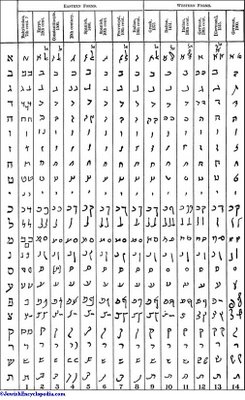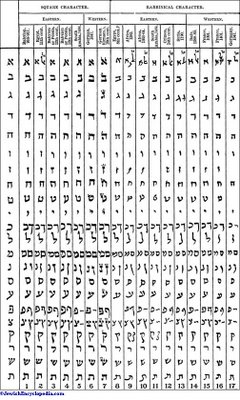Monday, April 10, 2006
Thursday, April 06, 2006
Aleph-bet soup

Readers of On the Main Line will know how much I love alphabets. This one is from a book of fonts called A compendium of the usuall hands of England, Netherlands, France, Spaine, and Italie with the Hebrew, Samaritan, Caldaean, Syrian, AEgyptian, Arabic, Greek, Saxon, Gotick, Croatian, Slavonian, Muscouian, Armenian, Roman, Florentine, Venetian, Saracen, AEthiopian and Indian characters : with sundry figures of men, beasts and birds. Published in London in 1663, the fonts were devised by Richard Daniel and engraved by Edward Cocker, "philomath."
The script on the left is called 'The letters of the running hands of the Jewes of Germany,' by which is meant the cursive script, and the one on the right is 'The letters of the running hands of the Jewes of Spaine.'
Compare with some of the forms from these images from the Jewish Encyclopedia, taken from actual Sephardic and Ashkenazic manuscripts:


Monday, April 03, 2006
Rabbins and rabbis
In my research for this blog I noticed something that I hadn't previously known: in English the prevalent tendency, by far, was to write "rabbins" as plural for "rabbi" up to, and including, well on into the 19th century.
Why is that? I knew that in German a rabbi is a rabbiner. English is Germanic &c. But that hardly seems a satisfactory explanation. Given that, when did rabbins become rabbis? And why?
The handy dandy Babelfish translator tells us that a rabbi in certain other languages is:
rabijn in Dutch
rabbin in French (aha!)
rabbiner in German
ραβίνος (rabinos) in Greek
rabbino in Italian
равин (rabin) (in Russian
rabino in Spanish
rabinus in Latin
ラビ in Japanese (sorry, I get lost here!)
And, of course, רב rav in Hebrew. Presumably every other language got its "rabbi" from references in the Christian scriptures, like Matthew 23. And the original language of said scriptures was Greek. In Greek the instances of "rabbi" were written as ραββι which can be written neatly in English as rabbi. Presumably the Hebrew word the writers of the Christian scriptures had in mind was not רב but רבי rabbee (י"א ribbee).
But what are rabbins in English?
Comes the Oxford English Dictionary to shed a little light:
rabbin The source of the n in th[is] forms is obscure: it may have originated in pl. forms (rabbins, rabbini) on the supposition that the pl. of the Heb. word was *rabbin (cf. assassin, bedouin, etc.).]
Aha! But we had a secret: the word they were looking for was rabbeim or rabbanim.
One more OED "fact":
Why is that? I knew that in German a rabbi is a rabbiner. English is Germanic &c. But that hardly seems a satisfactory explanation. Given that, when did rabbins become rabbis? And why?
The handy dandy Babelfish translator tells us that a rabbi in certain other languages is:
rabijn in Dutch
rabbin in French (aha!)
rabbiner in German
ραβίνος (rabinos) in Greek
rabbino in Italian
равин (rabin) (in Russian
rabino in Spanish
rabinus in Latin
ラビ in Japanese (sorry, I get lost here!)
And, of course, רב rav in Hebrew. Presumably every other language got its "rabbi" from references in the Christian scriptures, like Matthew 23. And the original language of said scriptures was Greek. In Greek the instances of "rabbi" were written as ραββι which can be written neatly in English as rabbi. Presumably the Hebrew word the writers of the Christian scriptures had in mind was not רב but רבי rabbee (י"א ribbee).
But what are rabbins in English?
Comes the Oxford English Dictionary to shed a little light:
rabbin The source of the n in th[is] forms is obscure: it may have originated in pl. forms (rabbins, rabbini) on the supposition that the pl. of the Heb. word was *rabbin (cf. assassin, bedouin, etc.).]
Aha! But we had a secret: the word they were looking for was rabbeim or rabbanim.
One more OED "fact":
to designate the chief Jewish authorities on matters of law and doctrine, the most important of whom flourished between the second and thirteenth centuries of the Christian eraIt's nice to know that the OED decided how rabbis are ranked!
The Jew, Being a Defence of Judaism...
I came across an interesting periodical

. The Israel's Advocate in the subtitle refers to a publication called Israel's Advocate; or, The Restoration of the Jews Contemplated and Urged, published also in New York between 1823 and 1827.
Jewish Encyclopedia explains that The Jew was a:

It goes on to continue, saying that just as Christian missionaries to the Jews felt that they had a right to go on the attack, as he puts it, Jews are entitled to a defense. The author appeals to equal rights, as a good American would. The author also seeks to establish, for the benefit of cautious Jews, that this publication is not intemperate, citing examples of "the martyr Isaac Orobio, whose crown of martyrdom proves his victory. Rabbi Isaac, the son of Abraham; Rabbi Lipman; David Levy, and Mr. Nicklesburger; of these five worthies, but one met danger, and that was personal only; two wrote in Hebrew, and the two last in English, in England, without damage or danger either to themselves or our community. It is paying a poor compliment to Americans, to suppose them less enlightened than Englishmen."
A very interesting feature of this publication is the following:

Throughout this publication (which ran for two years) one will only find "......ians" and "......ianity" mentioned.
The Jew printed detailed articles reacting to Israel's Advocate, which featured articles with titles like "Conversion of a Jew" and "Gentiles Praying For the Conversion of the Jews" and "Masonry Tributary to the progress of Christianity among the Jews". It looked like this:

אין חדש תחת השמש

. The Israel's Advocate in the subtitle refers to a publication called Israel's Advocate; or, The Restoration of the Jews Contemplated and Urged, published also in New York between 1823 and 1827.
Jewish Encyclopedia explains that The Jew was a:
Jewish monthly whose avowed object finds expression in its subtitle as "being a defense of Judaism against all adversaries, and particularly against the insidious attacks of Israel's advocate." It was published in New York city and edited by Solomon H. Jackson from March 1, 1823, to March 1, 1825. "The Jew" was the first Jewish periodical published in the United States, and was aimed against Christian conversionists.The very first issue begins as follows:

It goes on to continue, saying that just as Christian missionaries to the Jews felt that they had a right to go on the attack, as he puts it, Jews are entitled to a defense. The author appeals to equal rights, as a good American would. The author also seeks to establish, for the benefit of cautious Jews, that this publication is not intemperate, citing examples of "the martyr Isaac Orobio, whose crown of martyrdom proves his victory. Rabbi Isaac, the son of Abraham; Rabbi Lipman; David Levy, and Mr. Nicklesburger; of these five worthies, but one met danger, and that was personal only; two wrote in Hebrew, and the two last in English, in England, without damage or danger either to themselves or our community. It is paying a poor compliment to Americans, to suppose them less enlightened than Englishmen."
A very interesting feature of this publication is the following:

Throughout this publication (which ran for two years) one will only find "......ians" and "......ianity" mentioned.
The Jew printed detailed articles reacting to Israel's Advocate, which featured articles with titles like "Conversion of a Jew" and "Gentiles Praying For the Conversion of the Jews" and "Masonry Tributary to the progress of Christianity among the Jews". It looked like this:

אין חדש תחת השמש







